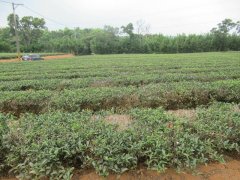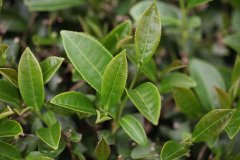Daily production management requirements of organic tea and organic tea gardens
The significance of organic cultivation in tea garden is to avoid the use of chemical synthetic pesticides and chemical fertilizers to produce tea. Its purpose is to maintain the health of tillers and consumers and to protect the ecological environment of the earth. The way of organic cultivation in tea garden is to use organic fertilizers to supply nutrients for tea growth, and to effectively utilize agricultural wastes as resources; the control of diseases and insect pests requires non-pesticide control, including biological control, artificial capture, physical control and cultivation management control; weed control also requires the use of non-pesticide methods such as mechanical and artificial weeding, planting green manure and ground mulching, etc. The operators of organic cultivation in tea gardens shall keep records of various cultivation and management operations, participate in the certification operations of relevant organs or organizations, and obtain the mark of "organic tea" products to facilitate the sale of the products.
In addition to drinking tea, the tea produced by organic cultivation can also develop diversified products of organic tea, such as organic powder tea, organic bag tea, cooking tea, tea wine, etc., so that consumers can have more choices and open up the tea sales market.

At present, the guidance situation of organic tea is summarized as follows: the implementation criteria of organic tea garden, the certification and specifications of organic tea are summarized as follows:
I. implementation criteria for organically cultivated tea gardens
(1) Environment: tea gardens where the air, water quality and soil are not polluted.
(2) fertilization:
Pure organic tea garden: do not use synthetic chemical fertilizers or growth regulators, but those who use unpolluted organic fertilizers or grow green manure crops for more than three years can be called pure organic tea products.
(3) Diseases and insect pests:
Pure organic cultivated tea garden: chemical synthetic pesticides are not used to control diseases and insect pests at all. the methods of biological control are as follows: using Trichogramma to control tea leaf roll moth, Wen's capture and planting, Shenze's leaf, sex pheromone to control tea leaf roll moth, lacewings, small pests and damage to Suri, tea silkworm, tea poison moth, debt avoidance moth, inchworm moth and other Lepidoptera pests. Physical control: tea garden with yellow sticky paper can be used to control small green leafhopper, spiny powder, thrips and aphids. High-pressure sprinkler facilities can be used to prevent drought. Manual capture method: tea silkworm, debt avoidance moth and inchworm moth can be used to reduce the density of insect pests. Cultivation and management: use pruning to remove diseased plants to keep the tea garden ventilated and avoid being too shady and wet.
(4) Weed control:
1. Artificial weeding:
The weeds that hinder the growth of tea trees, such as chicken vines, chicken dung vines and plough vines, are removed manually. The weeds near the tea canopy, such as Zhaohe grass, white grass, soil incense and Xianfeng grass, were dug up by artificial roots.
two。 Mechanical weeding:
Weeds growing in the tea line that hinder picking operations and competition for nutrients can be used to fertilize and weed together during intertillage fertilization.
3. Ground cover:
Cover materials such as mulch shell, peanut shell, bagasse and straw can be selected and applied to tea rows with a thickness of no more than 5 cm to avoid being too thick, resulting in poor soil ventilation or stagnant water in rainy season.
4. Planting green manure crops:
In winter (November to December), lupin and ryegrass were intercropped in tea line, and sesbania could prevent weeds in summer, but lupin was the best in tea garden.
5. The cultivation of strong trees can naturally form a shading effect, and the tea line covered with pruned branches in summer or winter can also prevent the growth of weeds.
6. Appropriate selection of weeds with short growing period, short growth, soft stems and leaves and strong soil and water conservation function on creeping ground, such as Feisha grass, Lei Gonggen and so on.
II. Certification and specifications of organic tea
(1) Certification conditions:
1. During the production process, through the technical guidance and investigation of the tea farm, it is confirmed that the cultivation is in accordance with the implementation guidelines and field management methods of crop organic cultivation established by the Department of Agriculture and Forestry, and has complete management records.
two。 The finished tea products collected from the person in charge of each area of the tea conversion farm to the pilot farmers shall be sampled and sent to the pesticide institute or relevant units for inspection to confirm that there are no pesticide residues and the data of the inspection report shall be attached.
3. The product conforms to the specification of organic agricultural products.
(2) specifications:
1. The appearance is tight and neat, hemispherical or strip-shaped, with good dryness and no coke.
2. The color is bright and dark green, and the golden edge of the tender leaves is hidden.
3. Resistant to brewing, soup honey green or golden yellow, clear and beautiful.
4. Delicate and elegant fragrance, no refined flavor, sweet and mellow moistening throat.
5. Standard or pure organic cultivation, no pesticide residue.
- Prev

Replanting organic tea to become a model for father and son to inherit sustainable land
S: "Hello everyone, I am Xu Shimeng. I have been making organic tea for 25 years." Standard 1: organic tea trees are harvesting OS in the early summer morning light in the countryside: in the soft morning light of early summer, driving through the dirt and gravel path, a whole green organic tea garden comes into view.
- Next

The organically cultivated Jinxuan oolong tea is soft, elegant and fresh.
The inheritance of organic cultivation of three generations of tea for 20 years follows the pursuit of perfection in tea making. Mingjian Township of Nantou County is located at the southernmost end of the Baguashan platform with an elevation of about 400 meters. The eastern slope of the mountain is sunny and sunny, which belongs to deep and fertile red soil with little gravel and acid soil with a pH value of 4.5 to 5.
Related
- The first cup of black tea in spring, the flavor and history of tea gardens in Kenya, Africa
- The computer can not only choose potatoes, but also grow tea rice. AI will grow winter oolong tea champion.
- It is not only the inflated tea bitten by insects, but also engraved with the four seasons tea in Beipu.
- The Oriental Beauty Tea Festival in Zhuxian County takes the stage at the weekend to experience the plus-size feast of oil tea.
- & quot; Oriental Beauty Tea & Exploration of Emei in Hsinchu, the hometown of quot;
- The new variety of strawberry "Tainong 1" dessert is the first choice with mellow aroma. Crimson gorgeous
- History of Tea in Taiwan: from Wild Inner Mountain to Export Tea Garden
- Two types of Taiwan Oriental Beauty Black Tea won the British three-Star Award for Childhood Tea Xiang Zhang Jiaqi changed from pilot to champion tea maker.
- Banana species and varieties: the planting history of Taiwan Xianren banana and dwarf banana is long, is banana disease resistant?
- Coffee planting Technology: Qianjie Coffee from Seedling to harvesting

